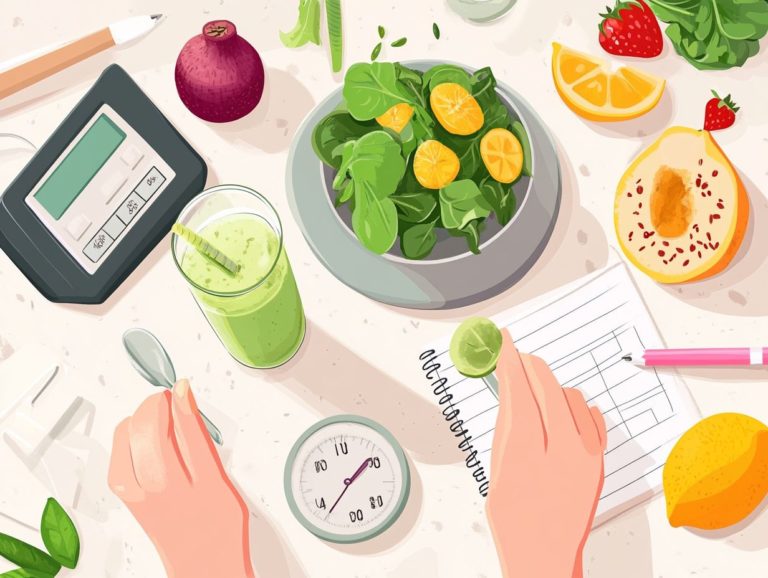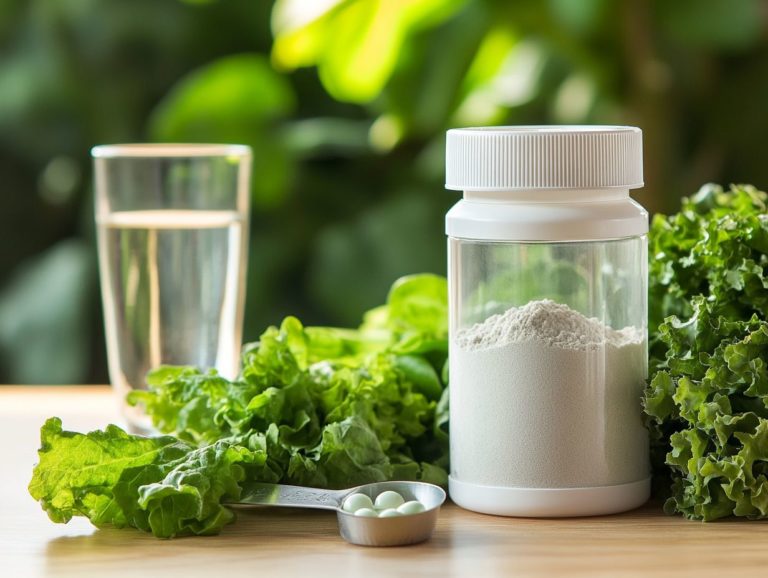Are Energy Drinks a Good Source of Vitamins?
Energy drinks have become extremely popular, promising quick energy boosts and better focus. But as you grab those colorful cans, you might wonder: are they reliable sources of vitamins?
This article explores the ingredients in energy drinks and the vitamins they might contain. You ll discover the exciting benefits and serious risks associated with their consumption. Plus, we ll share healthier alternatives to meet your vitamin needs without unwanted side effects.
Join us as we uncover the truth about energy drinks and what s really inside them.
Contents
- Key Takeaways:
- What are Energy Drinks?
- Do Energy Drinks Contain Vitamins?
- Potential Benefits of Vitamins in Energy Drinks
- Potential Risks of Consuming Vitamins in Energy Drinks
- Alternative Sources of Vitamins
- Frequently Asked Questions
- Are energy drinks a good source of vitamins?
- What vitamins are commonly found in energy drinks?
- Can energy drinks replace a multivitamin supplement?
- Are there any risks associated with consuming energy drinks for vitamins?
- Are there any energy drinks specifically designed as vitamin supplements?
- How can I ensure I get enough vitamins without relying on energy drinks?
Key Takeaways:
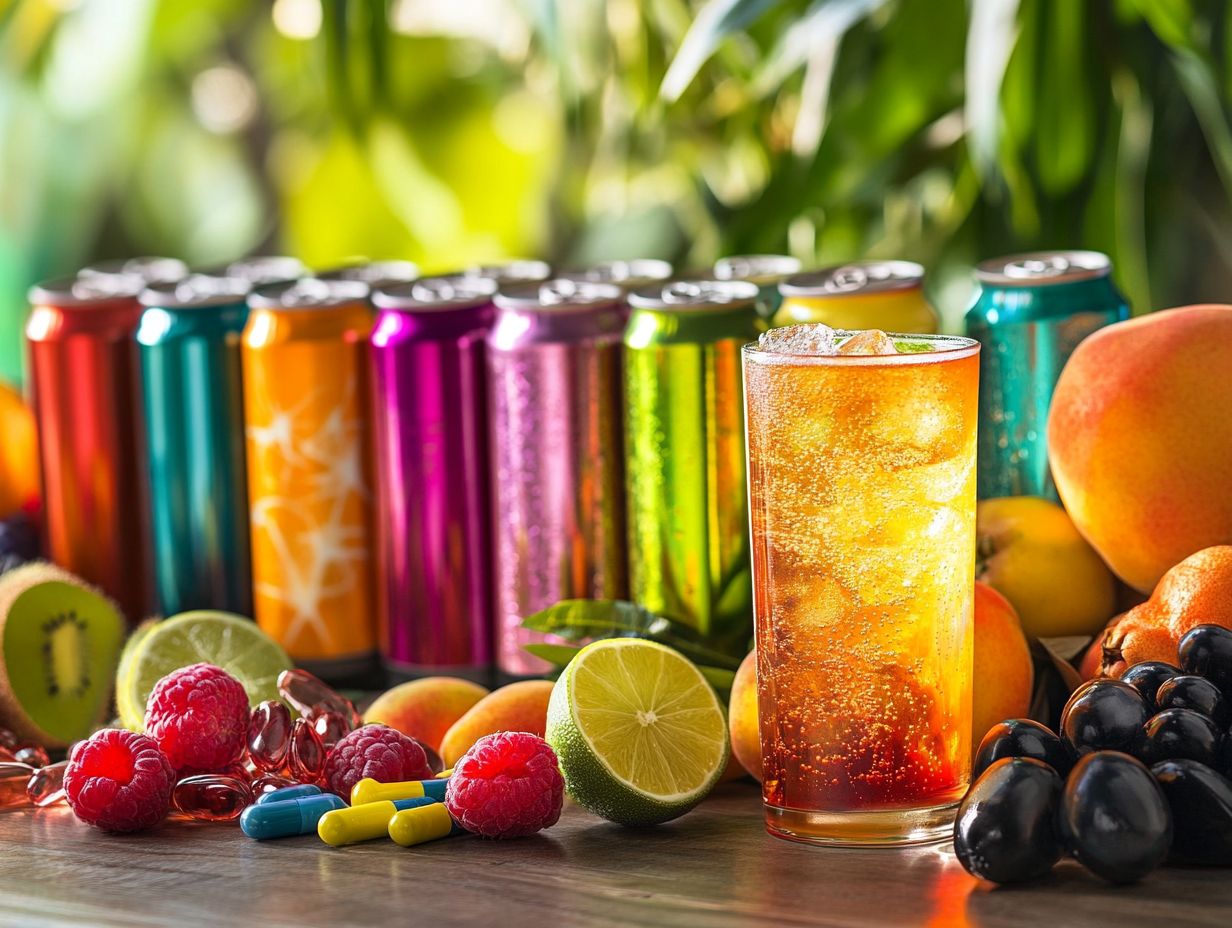
Energy drinks may have B vitamins and vitamin C, but they shouldn’t be your main source of these nutrients. The benefits might include better energy and focus, but they could be short-lived and not worth the risks of overconsumption.
Consider healthier options like whole foods and vitamin supplements instead of relying on energy drinks.
What are Energy Drinks?
Energy drinks are a popular choice, especially among college students looking for a quick pick-me-up.
These drinks often contain high levels of caffeine and stimulants like guarana and yerba mate, marketed as boosters for physical performance and mental clarity.
However, be cautious. When consumed too much or mixed with alcohol, they can lead to serious heart issues and other health risks.
Ingredients and Purpose
Energy drinks usually combine caffeine, sugar, B vitamins, and herbal extracts designed to boost energy and mental performance. These ingredients work together to help you push through fatigue and stay alert.
Caffeine is commonly found in higher doses than in regular sodas; it s a powerful stimulant that helps you stay awake and focused. Sugar adds sweetness and provides a quick energy source for that immediate boost.
B vitamins are essential for converting food into energy, fueling your body at the cellular level. Many brands highlight these benefits on their labels, promoting stamina, better thinking, and overall vitality to attract a wide range of consumers.
Do Energy Drinks Contain Vitamins?
Many energy drinks are fortified with vitamins, especially B vitamins, which are key for energy metabolism and addressing common nutritional gaps in young adults.
Common Vitamins Found in Energy Drinks
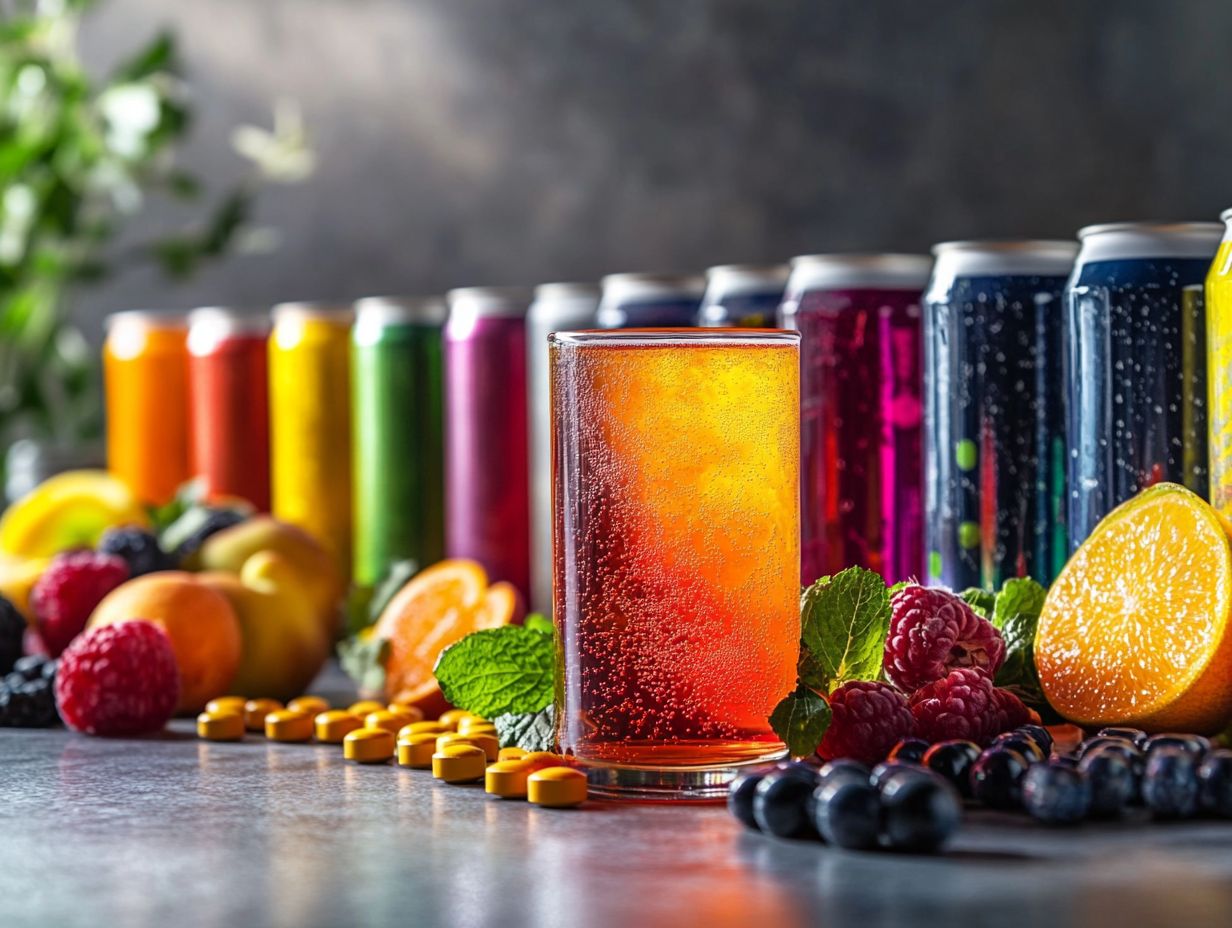
Common vitamins in energy drinks include B6, B12, niacin, and riboflavin, all vital for energy production and overall health. These vitamins help your body convert carbohydrates, proteins, and fats into usable energy.
For example, vitamin B6 is crucial for making neurotransmitters, impacting mood and sleep. Vitamin B12 is important for red blood cell formation and nerve health. Niacin assists with digestion and may help lower cholesterol, which is essential for heart health.
Riboflavin, often overlooked, is vital for energy production and protects your cells from damage.
When choosing energy drinks, always check the labels. Vitamin content can vary widely, and some drinks may have added sugars or stimulants that don t align with your health goals.
Potential Benefits of Vitamins in Energy Drinks
The vitamins in energy drinks can enhance your experience. You might enjoy increased energy levels and better mental performance.
These benefits can be especially appealing for busy college students and young adults managing hectic schedules.
Improving Energy Levels and Mental Focus
Many consumers reach for energy drinks when they need an immediate boost. They rely on caffeine and vitamins to sharpen their focus and enhance physical performance, especially during study sessions or workouts.
This reliance arises from the unique blend of ingredients these beverages offer, often featuring caffeine, taurine, B vitamins, and amino acids.
Research shows that caffeine can greatly enhance reaction time and thinking abilities. A study published in the Journal of Psychopharmacology revealed that moderate caffeine intake can significantly improve alertness and cognitive performance.
The vitamins work together to help combat fatigue, leading to noticeable boosts in both physical endurance and mental sharpness during demanding tasks.
Potential Risks of Consuming Vitamins in Energy Drinks
Energy drinks can be exciting, but too much can backfire. Indulging too much can lead to problems.
Drinking too much can lead to sleep disturbances, heightened anxiety, and an increased heart rate. These risks raise valid concerns about overall safety.
Excessive Intake and Negative Effects
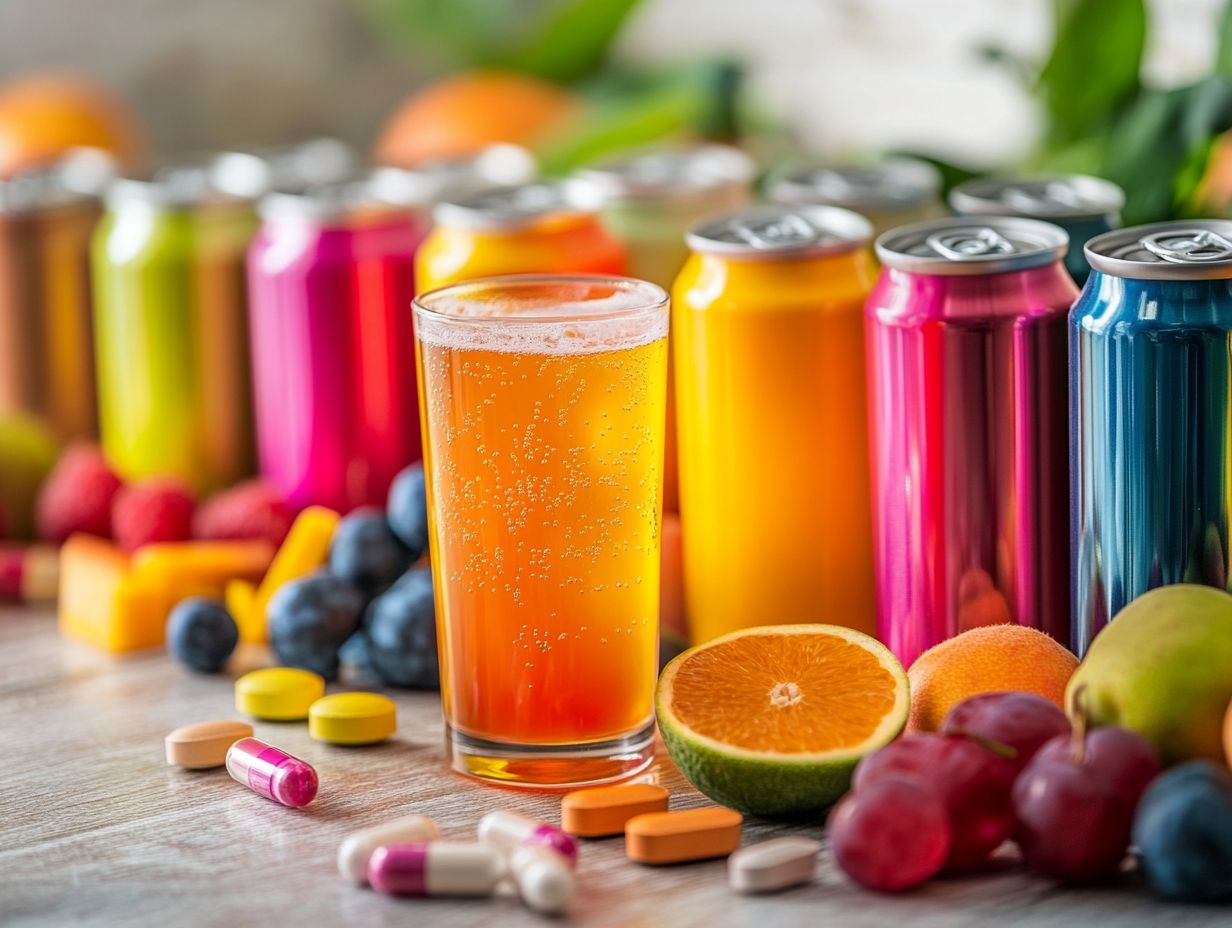
Excessive consumption of energy drinks can lead to various health issues due to their high caffeine content. This poses significant risks for children and young adults. Experts caution that indulging in these beverages can contribute to serious conditions, including heart problems, like arrhythmias (irregular heartbeats) and elevated blood pressure.
If you frequently consume high amounts of caffeine, you might notice disruptions in sleep quality, leading to chronic fatigue and mood disorders. The American Academy of Family Physicians stresses that these health concerns warrant attention, advocating for moderation and awareness of these products.
It s essential for parents and guardians to monitor their children’s intake, recognizing that even a single can can have cumulative effects on developing bodies.
Alternative Sources of Vitamins
Energy drinks may offer a swift boost of vitamins, but you have healthier alternatives available. These options can naturally fulfill your vitamin requirements without the potential risks associated with energy products.
Embracing these choices not only supports your health but also enhances your overall well-being.
Healthier Options for Meeting Vitamin Needs
Healthier options for meeting your vitamin needs include whole foods like fruits, vegetables, whole grains, and lean proteins. These provide essential nutrients without the added stimulants found in energy drinks.
These natural foods support bodily functions and enhance overall vitality and well-being.
For instance, leafy greens such as spinach and kale are packed with vitamin K and folate, promoting heart health and supporting cognitive functions.
Similarly, vibrant berries offer a powerhouse of antioxidants, helping to protect against oxidative stress and inflammation.
Whole grains like quinoa and brown rice deliver B vitamins that are crucial for energy production. Legumes provide protein along with essential vitamins like iron and magnesium.
By opting for these minimally processed choices, you can tap into the natural energy benefits that whole foods offer, improving health and sustaining energy levels throughout your day.
Watch this video to learn more about the effects of energy drinks.
Frequently Asked Questions
Are energy drinks a good source of vitamins?
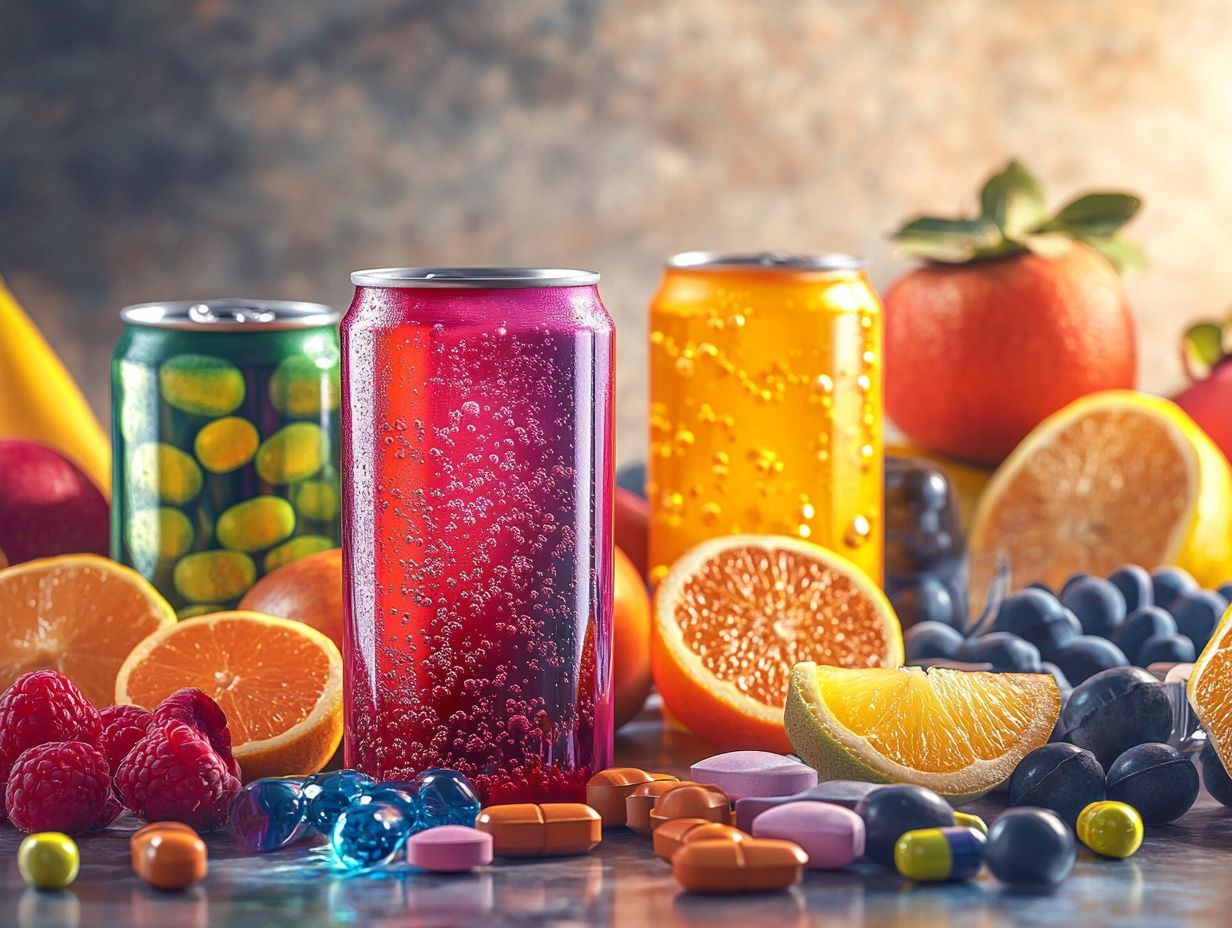
Check the Label! It depends on the brand and type of energy drink. Some may contain added vitamins, while others may not have any at all. It’s important to check the label and ingredients list to determine the vitamin content of a specific energy drink.
What vitamins are commonly found in energy drinks?
Many energy drinks contain B vitamins, such as B6 and B12, as well as vitamin C and niacin. These vitamins are often added to provide a quick energy boost, but they may not necessarily be in high enough amounts to be considered a good source.
Can energy drinks replace a multivitamin supplement?
No, energy drinks cannot replace multivitamins. They may contain some vitamins but often miss essential nutrients found in a balanced diet.
It’s best to get your vitamins from nutritious food and only use supplements when necessary.
Are there any risks associated with consuming energy drinks for vitamins?
Yes, relying on energy drinks for vitamins can be risky. Many contain high caffeine and sugar levels, which can harm your health if consumed excessively.
Limit your intake and focus on whole foods for vitamins.
Are there any energy drinks specifically designed as vitamin supplements?
Some energy drinks are marketed as vitamin supplements. Research these products and consult a healthcare professional before using them for your vitamin needs.
How can I ensure I get enough vitamins without relying on energy drinks?
Eat a balanced diet with plenty of fruits, vegetables, whole grains, and lean proteins.
If you’re worried about your vitamin levels, talk to a healthcare professional about a multivitamin supplement.


